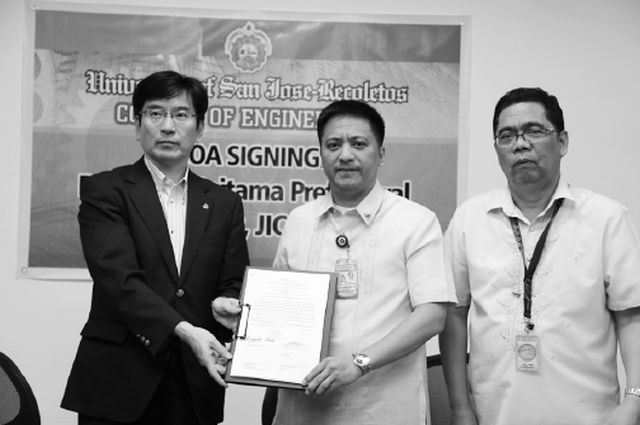USJ-R, Saitama renew ties on human resource

From left: Wada, Fr. Maspara and Dean Abellana during the MOA signing. (CONTRIBUTED PHOTO)
The University of San Jose-Recoletos and the local government of Saitama in Japan agreed to extend their partnership program that aims to prepare engineering graduates for work in Japanese companies.
USJ-R President Rev. Fr. Cristopher Maspara signed the renewal of agreement to two more years with Saitama Prefectural government for the second phase of the “Saitama-Cebu Comprehensive Human Resource Monozukuri Project” last Tuesday at the university’s conference room.
“USJ-R is very glad and very blessed to be a partner once again of Saitama for this project,” Maspara said during the re-signing of the memorandum of agreement (MOA).
The first phase of the program ran for three years and produced three batches of engineering students who were introduced to the “Monozukuri Principle,” or “the Japanese spirit of making things conscientiously.”
The students underwent intensive training courses A and B handled by Japanese experts, who will introduce them to Japanese engineering theories and practices.
The best performers were sent to Japan for free for actual immersion in Japanese companies.
Present during the event were Kimio Wada, associate director of the Saitama Prefectural government’s International Division and his colleagues Akihiro Namba and Ryoko Suto.
Representing the College of Engineering were Dean Virgilio Abellana and the department chairpersons, namely, Engr. Roel Militar (Electrical Engineering); Dr. Dennis Anthony Kilongkilong (Industrial Engineering); Engr. Anthony Jagures (Electronics Engineering); Engr. Elvira Sales (Civil Engineering); and Engr. Eutequio III Zante Palermo (Computer Engineering).
The Cebu Provincial government headed by Gov. Hilario Davide III was also a signatory to the agreement, as it is a collaboration between USJ-R, Saitama Prefecture and the province of Cebu.
“We would do our best to do our part to fulfill the vision and objectives of this project,” Maspara said. “We look forward to a meaningful work ahead for the next phase, and more,” he added.
Under the renewed agreement, the project, which is effective from May 2016 up to February 2018, is expected to train 125 engineering students from USJ-R and other Cebu-based universities on the Monozukuri Principle.
Other schools included in the project are the University of San Carlos, Cebu Technological University and Cebu Institute of Technology-University.
From 125 engineering students who will participate in intensive training courses A and B, 25 will be sent to Japan for cultural and educational immersion.
The Japan International Cooperation Agency (JICA) is still the primary funding agency under the International Cooperation Program of Japan while the Saitama Prefecture manages the implementation of the project.
USJ-R will be the coordinator for the participating schools in Cebu.
“We would like to make USJ-R as a hub in our efforts to help students in Cebu,” Wada said.
“We hope that this project grows to include the whole Philippines and the Southeast Asia in the future.”
A new feature included in the program is the internship grant to five selected engineering students in high-end Japanese companies in the country, with JICA footing the bill.
Wada said it is rare for a Japanese government unit to collaborate with a foreign government unit and foreign academic institutions.
But he added that they are upbeat about the renewal of linkages because “students from the Philippines are really polite, industrious and aggressive. They want to learn more.”
The Japanese official revealed that even the Japanese media are picking up the story and reporting it as a “good news story.”
He said the last batch of engineering students sent to Japan were featured by Japan Broadcasting Corporation, Japan’s national public broadcasting organization.
“Many people come to Japan for work, so we are helping your students get attuned to Japanese practices and culture even before they graduate,” he said.
“The companies in Japan, especially in Saitama, would like to contribute to the development of Cebu and the Philippines,” he added.
Disclaimer: The comments uploaded on this site do not necessarily represent or reflect the views of management and owner of Cebudailynews. We reserve the right to exclude comments that we deem to be inconsistent with our editorial standards.




